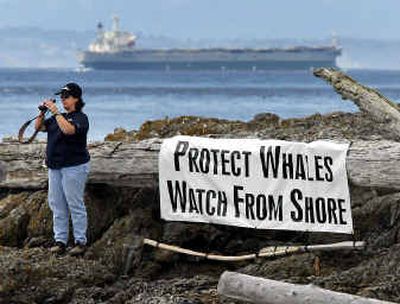Whale-watching boats may harm whales

TACOMA — Are whale-watching operations increasing pressure on the state’s dwindling population of resident killer whales?
University of Washington researcher David Bain and a partner, Jodi Smith, are trying to find out.
Bain, an animal behavior expert who has studied orcas for 20 years, is part of an international group of government-backed scientists working to learn why the local population has dropped from 98 in 1995 to 83 today, The News Tribune reported Sunday.
Washington’s killer whales — the southern resident population — typically spend summers chasing salmon in and around Haro Strait, the 6-mile-wide passage between Vancouver, B.C., and the San Juan Islands.
For years now, their annual visit has drawn tourists and flotillas of commercial whale-watch boat operators based in Washington and Canada.
Scientists believe the orcas’ decline is caused by marine traffic, human encroachment, faltering salmon runs and pollution. It isn’t clear whether whale watching is part of the equation.
Bain, Smith and other scientists suspect boat noise might interfere with the orcas’ echolocation — the way they bounce sounds off objects to monitor their surroundings and find prey.
Recent increases in the number of whale watchers, both on pleasure craft and commercial vessels, have heightened these concerns.
Over the past two years, the government has provided $2.25 million to researchers trying to learn more about the state’s resident orcas. Sen. Maria Cantwell, D-Wash., announced last week that she’s seeking congressional approval of an additional $1.5 million.
Canadian scientists have already concluded that the northern resident orcas in British Columbia burn more energy when boats are present, so they must eat more to sustain themselves.
If the same holds true for southern residents in Puget Sound, that would affect their survival, Bain said.
Many whale-watching operators are conservation-minded and “making a serious effort to understand what is going on,” he said.
But if research proves boat noise hurts the whales, Bain said, limits might be needed on hours, days or locations.
The popularity of whale watching signals public support that is crucial to conservation.
“If whale-watch operators can get hundreds of thousands of people to rally behind whales, it can more than offset the impact they’re having,” he said.
He, Smith and other researchers have been monitoring daily the whales, the boats and their proximity to whales.
U.S. and Canadian laws prohibit whale harassment. But not everybody follows the rules. Canadian authorities recently fined a U.S. whale-watching operator $6,500 (Canadian) for getting too close to whales in the Gulf Islands, according to a recent state report.
U.S. officials haven’t taken similar action, partly because of lack of evidence and resources, said Mark Oswell, a spokesman for the National Marine Fisheries Service law enforcement.
“A lot of people harassing them don’t realize they’re doing it,” he said. The agency promotes boater education.
Some activists already believe boats are detrimental to orcas. “Protect Whales, Watch From Shore,” declares an 8-foot-long banner, one of several stretched along San Juan Island’s shore by the Orca Relief Citizens Alliance.
“Our point is: Watch whales. See what magnificent creatures they are. And do it in a safe way for the whales,” said group director Birgit Kriete.
The campaign infuriates some whale-watch tour operators. But Tom McMillen, who runs Salish Sea Charters, concedes there is sometimes a circus atmosphere on the water. He noted operators now subscribe to a paging service that tracks the animals.
“There’s no mystery. I know right where we’re going,” McMillen said one evening as he headed out to Haro Strait. “That’s neat, but it’s sad in a way. They (the whales) don’t get a break ever.”